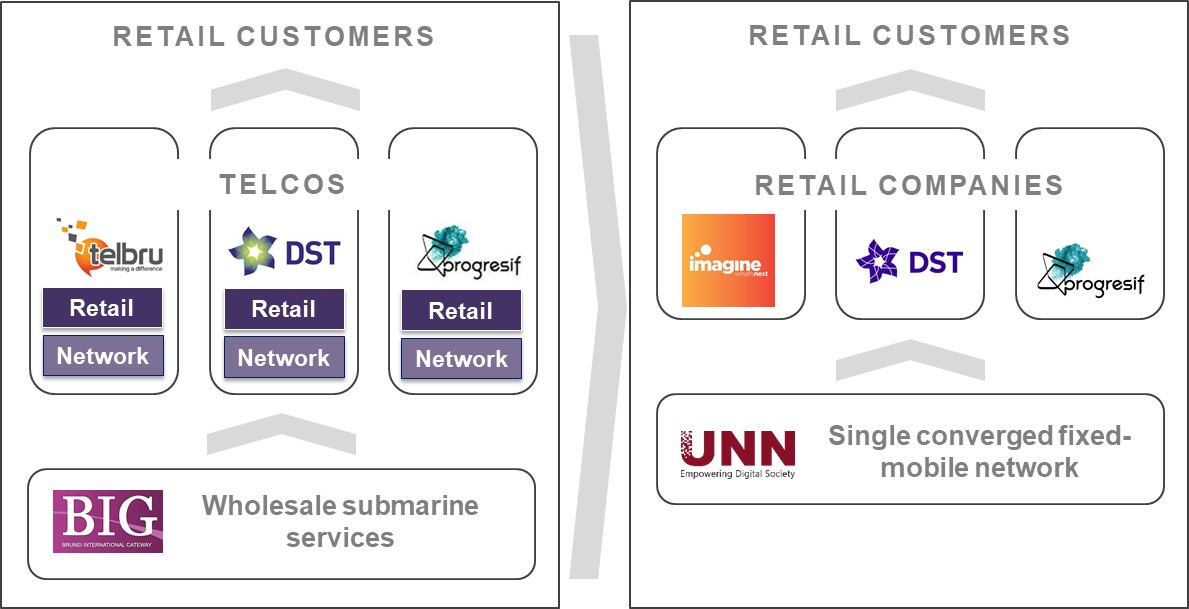Changing the operating model: the creation of UNN in Brunei Darussalam
27.08.2020Introduction
Until 2019, the telecommunications industry structure in Brunei Darussalam was based on the traditional model of vertically integrated telecommunications providers (telcos) competing with each other, with Telekom Brunei Berhad (TelBru) the fixed incumbent, DST Communications Sdn Bhd (DST), and Progresif Cellular Sdn Bhd (Progresif) providing mobile services. Each telco largely offered services based on their own respective networks. Located on the island of Borneo, Brunei Darussalam relied on submarine cable networks managed by the Brunei International Gateway Sdn Bhd (BIG) for international connectivity.
Brunei Darussalam has a relatively small population of about 420 000 inhabitants and has a correspondingly small telecommunications sector, which limits the ability of individual operators to create scale and scope economics over their respective networks. In addition, all telcos are fully government-owned, making changes in industry structure a more straightforward proposition than would be the case in markets with privately held assets.
Network consolidation
Following a comprehensive strategic study of the performance of the sector, conducted by Darussalam Assets Sdn Bhd (Darussalam Assets), the owner of all telcos in Brunei Darussalam, a decision was made to consolidate all fixed, mobile, and international submarine telecommunications assets in a single network company, Unified National Networks Sdn Bhd (UNN). UNN was founded in late 2018 and took ownership of all network assets at the end of August 2019. The submarine cable network operator, BIG, was merged into UNN in its entirety. UNN is also fully owned by Darussalam Assets. Darussalam Assets is a private limited company owned by the Minister for Finance Corporation (MOFC).
From January 2020, when the new ecosystem went live, the newly formed service providers have access to UNN’s network infrastructure on cost-oriented, transparent and non-discriminatory terms to provide a level playing field for competition and to stimulate the introduction of innovative and faster services to customers. The impact of the introduction of UNN is significant, with fixed incumbent TelBru now able to offer mobile services under the new brand “imagine”, mobile market leader DST now offering fixed services, and mobile challenger Progresif now having access to 4G and fixed infrastructure for the first time. Together these developments allow for “all service” converged competition in the market. The following figure shows the industry structure before and after the introduction of UNN.

Source: Darussalam Assets.
A pioneer in infrastructure sharing
The Brunei NetCo program is the first of its kind in the world, with the scope of asset sharing and convergence far exceeding other initiatives like, for example, BT’s OpenReach in the United Kingdom or the Singapore NBN. The program puts Brunei at the forefront of the international trend to share scarce network resources and avoid unnecessary asset duplication, while promoting more intense competition in the retail segment. The new industry structure has been designed to promote efficiency and stimulate competition at the retail layer of the supply chain by lowering the barrier to entry to the market and by lowering the barrier to switch for consumers and businesses through the parallel introduction of number portability in January 2020.
Such extensive network sharing has been made possible through the introduction of an industry-wide change program to ensure key processes, like service delivery, service assurance, customer care and billing, continue to be executed, only now governed by detailed contractual terms between separated legal entities where applicable. Next to the network transfer and integration, this has required an ambitious redesign of IT processes in particular, with application programming interfaces (APIs) now presenting the formal interface between the network and retail service providers.
Regulatory changes
The regulatory environment is adapting too, shifting from addressing significant market power (SMP) of vertically integrated telcos, to the new situation where UNN is the monopolist provider of all network wholesale services. UNN is subject to strict regulatory oversight by the Authority for Info-communications Technology Industry of Brunei Darussalam (AITI) and is subject to shareholder control by Darussalam Assets, to promote efficiency and innovation at the network layer, while also ensuring that the retail service providers have access to network resources on non-discriminatory, transparent, and cost-oriented terms.
It is too early to assess the performance of the new ecosystem in Brunei Darussalam in full, but since “Go Live” in January 2020, customers have a wider choice of offers from their service providers, with new bundles of services made available, and with network usage up significantly from their 2019 levels. Over time UNN is expected to implement further efficiencies so as to reduce wholesale tariffs, with customers expected to benefit from cheaper, faster, and more widely available digital services. UNN has also been tasked with integrating and optimizing the legacy telecommunications networks, followed by an ambitious investment programme to enhance the availability, capacity and security of high-speed services, for example by expanding the fibre-to-the-home footprint in the country and by upgrading the mobile network to 4G+ and then 5G.
Last updated on: 19.01.2022